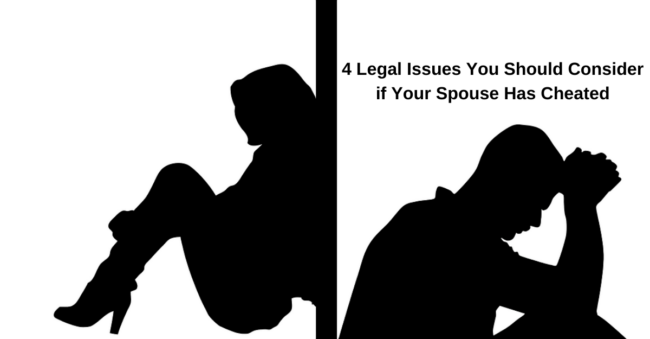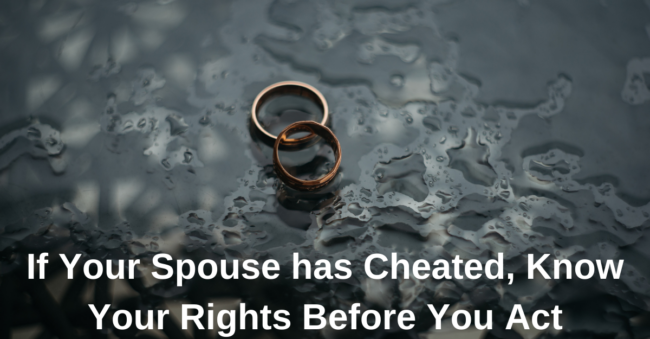
Discovering that your spouse has cheated can be emotionally devastating, and it may lead to various legal issues that need to be addressed. While laws vary depending on the jurisdiction, here are four legal issues you should consider if your wife has cheated and you are seeking guidance regarding your rights:
- Divorce and Dissolution of Marriage: Infidelity can be grounds for divorce in some jurisdictions. If your wife has cheated and you wish to end the marriage, you may be able to file for divorce based on adultery. In such cases, you typically need to provide evidence of the affair. It’s important to consult with a family law attorney who can guide you through the divorce process, help protect your rights, and ensure that your interests are represented during property division, child custody, and spousal support proceedings.
- Property Division: When going through a divorce, one of the key legal issues is the division of marital assets and debts. Laws regarding property division vary, but in many jurisdictions, marital property is divided equitably or fairly between spouses. Adultery might be considered a relevant factor in determining the distribution of property, depending on the specific circumstances and applicable laws. Consult with a family law attorney to understand how infidelity might impact property division in your jurisdiction.
- Child Custody and Visitation: If you and your wife have children, the issue of child custody and visitation rights will need to be addressed during divorce proceedings. In most jurisdictions, courts prioritize the best interests of the child when making custody determinations. The fact that your wife cheated does not automatically disqualify her from having custody or visitation rights, but it might be considered as a factor if it can be shown to have a detrimental impact on the child. Consulting with a family law attorney will help you understand the specific laws and factors that apply to child custody cases in your jurisdiction.
- Spousal Support or Alimony: In some cases, the spouse who has been cheated on may be entitled to spousal support or alimony. The availability and amount of spousal support depend on various factors, including the length of the marriage, the financial situation of both spouses, and the impact of the adultery on the marital relationship. Consulting with a family law attorney will help you understand whether you may be entitled to spousal support and what factors the court may consider when determining the amount and duration.
1. What legal actions could you take against your partner if they have cheated?
If your wife has cheated, you may have certain legal claims against her, depending on the laws of your jurisdiction and the specific circumstances of your case. Here are three potential claims you could consider:
- Divorce Based on Adultery: In many jurisdictions, adultery is recognized as grounds for divorce. If your wife has cheated, you may have the right to file for divorce based on her infidelity. The laws regarding divorce vary, so it’s essential to consult with a family law attorney to understand the specific requirements and procedures in your jurisdiction. Filing for divorce based on adultery can potentially impact the division of assets, child custody arrangements, and spousal support determinations. Divorce based on adultery is a complex legal process with many considerations. It’s important to be well-prepared for the changes that come with finalizing a divorce, including updating personal information and documents. One helpful resource is a name change kit, which can streamline the process of reverting to a maiden name or adopting a new surname.
- Breach of Marital Contract: Marriage is considered a legal contract between spouses. If your wife has cheated, you might argue that she has breached the marital contract by violating the expectation of fidelity. Proving a breach of marital contract can be challenging, as it often requires demonstrating that the infidelity has caused significant harm or damages. Consulting with an attorney specializing in family law will help you assess the viability of a breach of contract claim in your specific circumstances.
- Emotional Distress: Discovering that your wife has cheated can cause significant emotional distress and anguish. In some jurisdictions, you may have the right to pursue a claim for emotional distress caused by your spouse’s infidelity. Successfully pursuing an emotional distress claim requires demonstrating that the emotional harm was severe, resulted from the spouse’s actions, and can be quantified in some way. It’s important to consult with a personal injury attorney or a family law attorney to understand the potential for pursuing an emotional distress claim in your jurisdiction.
2. What kind of proof is required to establish that your partner has been disloyal to you?
When attempting to prove that your wife has been unfaithful, it’s important to gather evidence that supports your claim. The specific evidence required may vary depending on the laws of your jurisdiction and the circumstances of your case. Here are several types of evidence that can be helpful in proving infidelity:
- Direct Evidence: Direct evidence includes tangible proof of your wife’s infidelity, such as photographs, videos, or messages that clearly demonstrate her involvement in an extramarital affair. This could involve explicit text messages, explicit photographs, or even eye witness accounts of her engaging in adulterous behavior. Obtaining such evidence legally and ethically is crucial, and you should consult with an attorney to ensure you do so within the boundaries of the law.
- Circumstantial Evidence: In many cases, direct evidence of infidelity may be difficult to obtain. In such situations, you can consider gathering circumstantial evidence that, when combined, strongly suggests that your wife has cheated. This might include frequent and unexplained absences, sudden changes in behavior or appearance, unusual expenditures, or finding unfamiliar items, such as gifts or clothing, in her possession. While circumstantial evidence may not be as conclusive as direct evidence, it can still be compelling when presented effectively.
- Testimony: Testimony from witnesses who can provide firsthand accounts or observations of your wife’s infidelity can be valuable evidence. This could include statements from friends, family members, colleagues, or even private investigators who have documented evidence of her involvement in an extramarital affair. Witness testimony can help corroborate your claims and strengthen your case.
- Electronic Communication: In today’s digital age, electronic communication can provide valuable evidence of infidelity. This includes email exchanges, text messages, social media posts, and call logs that indicate suspicious or inappropriate interactions between your wife and someone outside the marriage. İt’s important to note that privacy laws vary, and it is essential to gather such evidence legally and ethically.
- Financial Records: Unusual financial transactions or expenditures can sometimes indicate infidelity. Reviewing bank statements, credit card records, and other financial documents may reveal suspicious activities, such as hotel charges, restaurant bills, or purchases that cannot be easily explained. While financial records alone may not conclusively prove infidelity, they can be used as supporting evidence to establish a pattern of behavior consistent with cheating.
3. In what way could your spouse’s infidelity impact the custody of your children?

If your wife has cheated, it may potentially impact child custody arrangements during divorce or separation proceedings. The effect of infidelity on child custody varies depending on the jurisdiction and the specific circumstances of the case. Here are a few ways in which infidelity might affect custody:
- Best Interests of the Child: In most jurisdictions, the primary consideration in determining child custody is the best interests of the child. Courts strive to make decisions that promote the child’s well-being, stability, and overall welfare. While infidelity alone does not automatically disqualify a parent from obtaining custody, it can be considered as a factor if it can be shown that the cheating has a negative impact on the child’s well-being.
- Parental Fitness and Moral Character: When making custody determinations, courts often assess the moral character and parental fitness of each parent. If infidelity can be proven and is deemed relevant by the court, it may impact the perceived moral character of the parent who cheated. However, it’s important to demonstrate how the infidelity affects the child’s upbringing or well-being, such as evidence of neglect or exposing the child to an unhealthy environment.
- Impact on Co-Parenting: Infidelity can sometimes strain the ability of parents to effectively co-parent and communicate for the benefit of the child. If the infidelity has led to a breakdown in trust or has significantly impaired the ability to co-parent, it may be considered by the court when making custody decisions. Courts generally prioritize parents who can demonstrate a willingness and ability to cooperate and make decisions in the child’s best interests.
4. Is it possible to take legal action against the person your spouse had an affair with for causing the breakdown of your marriage?
The ability to sue your spouse’s paramour, also known as a “third-party” or “alienation of affection” claim, depends on the laws of your jurisdiction. While some jurisdictions recognize such claims, others do not. Here are a few points to consider regarding suing your spouse’s paramour:
- Alienation of Affection: In jurisdictions that recognize alienation of affection claims, you may have the right to sue the third party who allegedly contributed to the breakdown of your marriage. These claims typically require proving that the paramour intentionally engaged in conduct that caused the alienation of affection, thereby damaging your marital relationship. However, it’s important to consult with a family law attorney to understand whether your jurisdiction recognizes this claim and what specific requirements must be met to pursue it.
- Criminal Conversation: Some jurisdictions provide a cause of action known as “criminal conversation” that allows you to sue your spouse’s paramour for engaging in sexual relations with your spouse while you were still married. This claim focuses on the act of adultery rather than the alienation of affection. However, it’s crucial to note that criminal conversation claims are generally limited to seeking compensation for the harm caused by the affair, rather than the destruction of the marriage itself.
- Emotional Distress: In situations where your spouse’s infidelity has caused significant emotional distress, you may have the right to pursue a claim against the paramour for intentional infliction of emotional distress. This claim would typically require demonstrating that the paramour’s actions were extreme and outrageous, and that they intentionally or recklessly caused you severe emotional distress. However, proving such a claim can be challenging, and it’s advisable to consult with a personal injury attorney to assess the viability of this approach.
- Consult an Attorney: Laws regarding suing a spouse’s paramour vary significantly across jurisdictions, and some jurisdictions do not recognize these claims at all. Consulting with a family law or personal injury attorney who is knowledgeable about the laws in your jurisdiction is crucial. They can provide guidance on the specific legal options available to you, assess the strength of your case, and help you understand your rights and potential remedies.
Before taking action, be aware of your rights if your partner has been unfaithful.

Discovering that your wife has cheated can be a deeply challenging and emotional experience. It’s important to understand your rights and legal options before taking any action. Here are some key rights to consider if your spouse has cheated:
- Right to Seek Divorce: If your wife has cheated, you generally have the right to seek a divorce. In many jurisdictions, adultery is recognized as a valid ground for divorce. Understanding the divorce laws in your jurisdiction and consulting with a family law attorney will help you navigate the legal process, protect your rights, and make informed decisions regarding property division, child custody, and support.
- Right to Fair Property Division: During divorce proceedings, you have the right to a fair division of marital property. Infidelity may or may not directly impact property division, as laws vary across jurisdictions. Consulting with a family law attorney will help you understand how infidelity might be considered by the court and how it could potentially affect the division of assets.
- Right to Child Custody Determination: If you have children with your wife, you have the right to seek a fair determination of child custody and visitation rights. Courts prioritize the best interests of the child when making custody decisions. While infidelity alone may not automatically impact custody, it may be considered if it can be shown to have a negative impact on the child’s well-being. Consulting with a family law attorney will help you understand the specific factors considered in custody cases in your jurisdiction and how infidelity might be relevant.
- Right to Seek Spousal Support: Depending on the circumstances, you may have the right to seek spousal support or alimony if your wife’s infidelity has had a significant impact on your financial well-being. Spousal support laws vary, and eligibility and entitlement depend on factors such as the length of the marriage, the financial disparity between spouses, and the impact of the infidelity on the marital relationship. Consulting with a family law attorney will help you understand your rights and options regarding spousal support.
- Right to Emotional Support: Discovering that your wife has cheated can be emotionally devastating. It’s important to seek emotional support from friends, family, or professionals who can help you navigate through the difficult emotions and decisions that may arise. Taking care of your emotional well-being is an important right and should not be overlooked during this challenging time.
FAQs
What is the legal term for cheating on your spouse?
The legal term for cheating on your spouse varies depending on the jurisdiction and the specific context in which it is addressed. There are a few commonly used terms that describe the act of infidelity within the legal realm:
- Adultery: Adultery is a widely recognized term used to describe the act of a married person engaging in sexual relations with someone other than their spouse. It is considered a legal term that specifically refers to extramarital sexual relationships. Adultery can have legal implications in divorce proceedings, as it may be grounds for divorce in some jurisdictions or be considered a relevant factor in property division, child custody, or spousal support determinations.
- Marital Infidelity: Marital infidelity is a broader term that encompasses various forms of betrayal or unfaithfulness within a marital relationship. It refers to actions by a spouse that breach the expectation of fidelity, which may include emotional affairs, physical affairs, or any form of intimate relationship outside the marriage. Marital infidelity can have legal consequences in terms of divorce, property division, and other related issues, but the specific legal term used may depend on the jurisdiction.
- Breach of Marital Contract: While not a specific legal term, the concept of a breach of the marital contract can be applied in cases of infidelity. Marriage is considered a legal contract between spouses, and infidelity can be seen as a violation of the agreed-upon terms of that contract. In some cases, spouses may argue that the infidelity constitutes a breach of the marital contract, which can have legal implications in divorce proceedings or when addressing issues like property division or spousal support.
What case should I file when my husband is cheating?
When your wife has cheated, the specific legal action you should file will depend on the laws of your jurisdiction and the outcome you seek. Here are three common legal options to consider:
- Divorce Petition: If you wish to end your marriage due to your wife’s infidelity, you can file a divorce petition. Divorce proceedings legally dissolve the marriage and address various issues, including property division, child custody, child support, and spousal support. Consult with a family law attorney to understand the divorce laws in your jurisdiction and the specific requirements and procedures for filing a divorce petition.
- Complaint for Adultery: In some jurisdictions, you may have the option to file a complaint for adultery. This legal action specifically focuses on proving that your wife engaged in extramarital sexual relations. Adultery laws vary, and not all jurisdictions recognize this claim. Consult with an attorney to determine if adultery is a recognized legal cause of action in your jurisdiction and if filing a complaint for adultery is a viable option for you.
- Modification of Agreements: If you already have existing agreements or court orders related to child custody, child support, or spousal support, you may consider filing a modification request based on the infidelity. Infidelity can potentially impact these agreements if it can be shown that the cheating spouse’s behavior affects the well-being of the children or creates a substantial change in circumstances warranting a modification. Consult with an attorney to understand the requirements for modifying existing agreements and whether infidelity could be a relevant factor in your case.